[Click on BLUE links for sources and further information]
Better views of some of the charts and some of the analysis used in this post can be found HERE: Wage Stagnation in Nine Charts
America can be divided into five income classes: the hoity toitys, the rich, the well-off, the hoi polloi, and the poor. For every dollar the economy produces from our joint efforts, the hoity toitys (some call them the “high-mucky-mucks) take home about 50 cents. The rich pocket a quarter. The well-off scramble for the next 14 cents while the hoi polloi must get by on less than a dime. The poor? Not even a nickel. If all incomes were equal (something I do not advocate), each of the five classes would earn exactly 20 cents.
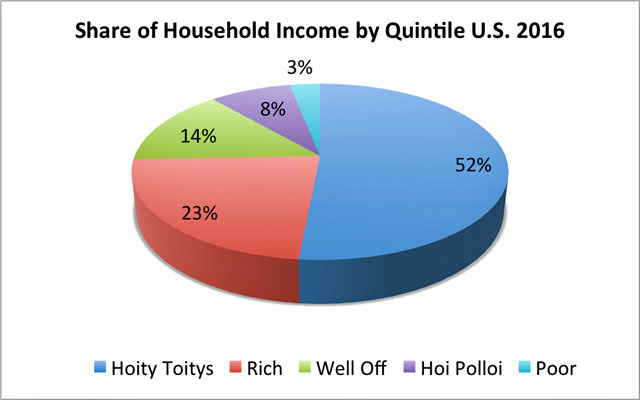
Source www.statista.com
Inequality has increased since 1970. The high-mucky-mucks picked up 9 more cents while everyone else lost out.
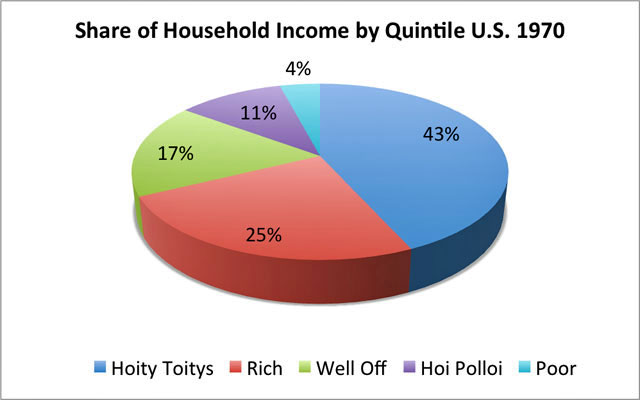
Source www.statista.com
Income is what you earn. Wealth is what you have accumulated (saved or inherited and stashed away). Wealth is far more unequally distributed than income. Inequality of income is one reason. The rich consistently earn more than the poor. They save and invest much of this extra income. That’s good for them and can be beneficial for the economy. Unfortunately the good fortune of the high-mucky-mucks has not been shared for a generation. For the three decades after World War II it was generally true that a “rising tide raises all boats.” We worked together to produce the economic growth that made us all better off and we shared the benefits, not equally but in a way most considered fair. However, since the 1970s the wealthiest Americans have garnished most of the gains from economic growth while the poor and the hoi polloi have seen their financial situation deteriorate. Inheritance is an additional reason the rich get richer. While many middle class Americans work hard hoping to leave their children a modest inheritance to get started in life, the high-mucky-mucks have been busy creating a super wealthy privileged class that has been maintained over generations.
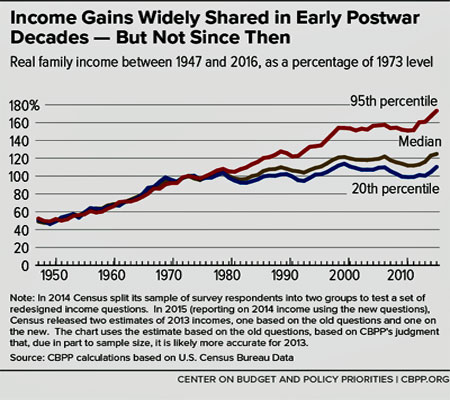
Source www.statista.com
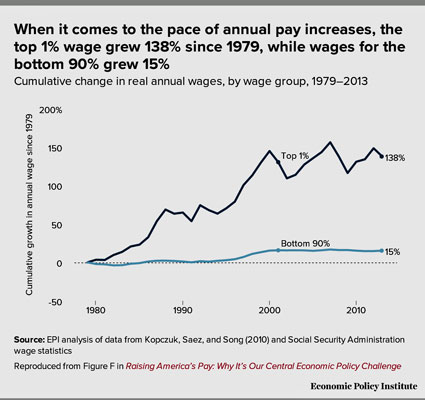
Today the hoity toitys own nearly 90% of all the wealth in the country (all the stocks, all the bonds, all the real estate, etc, etc). The rich own most of the rest except for a few carrots thrown to the just-well-off. The hoi polloi and the poor owe more than they own. They are perpetually in hoc to the creditors, the high-mucky-mucks, who charge usurious interest rates on the credit card purchases and payday loans they foist on ordinary folks who respond, as predicted, to the misleading advertisements that bombard them every day informing them that they can live like kings if they simply buy on credit. In the meantime, the high-mucky-mucks borrow at zero interest to lend at much higher rates to the poor dolts who think they are Matthew McConaughey and happily buy the leather shoes and fancy cars that push them further into debt. Such nonsense is possible because the Federal Reserve thinks its good for the economy. In the United States, the 400 richest individuals now own more wealth than the bottom 64 percent of the population … the three richest [men, and they are men] own more wealth than the bottom 50 percent [of the entire population]. [Source]
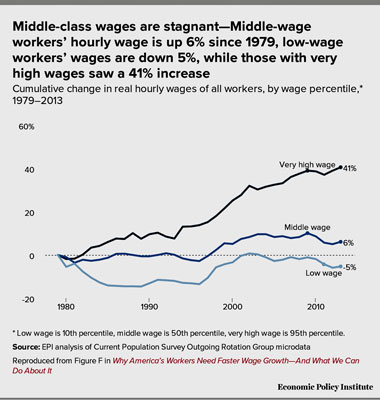
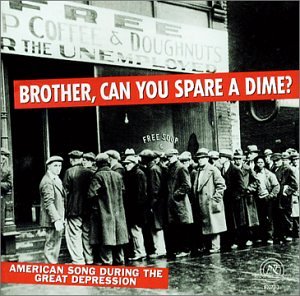
Apparently earning over half of all the income and owning 90% of all the assets isn’t quite enough to provide sufficient incentive for the high-mucky-mucks to continue offering us their valuable services. They want a tax cut. They need a tax cut in order to bring back jobs, the jobs they’ve moved overseas. They also want to repeal the pesky inheritance tax, a tax less than one percent of Americans pay, those Americans who already own 90% of all the assets. CEOs make 296 times what a typical worker earns and that doesn’t include a lot of goodies the average guy or gal never sees.
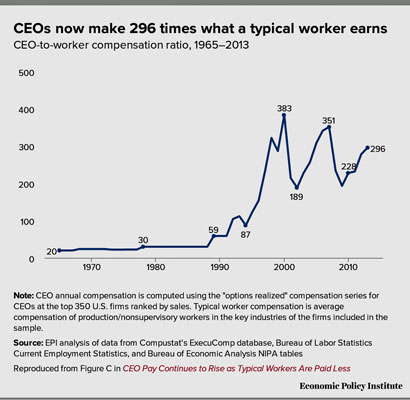
Since 1970 both income and wealth have steadily become more unequally distributed. Inequality today is as high as it was during the time of the robber barons who rolled their cigars in hundred dollar bills and partied like Great Gatsby in the Roaring Twenties.
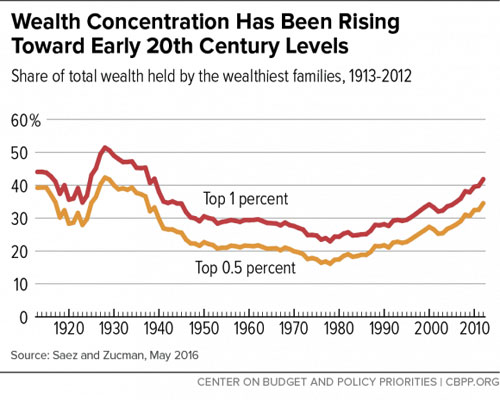
You surely know what happened after that. The Great Depression. Was inequality the cause? No, there were many causes (see J.K. Galbraith The Great Crash and Milton Friedman The Great Contraction for a start). However, inequality destroys the glue that holds a free society together. As of today that glue has been heavily watered down.
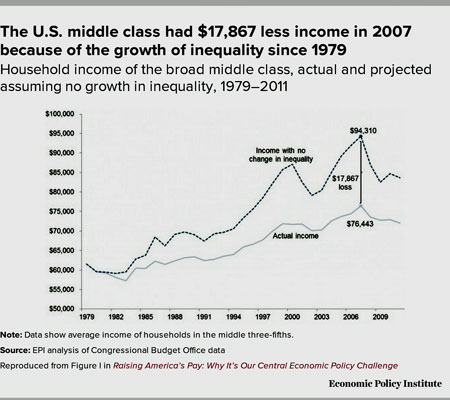
A great number of Ordinary People are pissed off. They have retreated at warp speed to the extreme ends of the political spectrum.
Those on the right are experiencing a Hobbesian moment, a realization that life is “solitary, poor, nasty, brutish and short”. Hobbes recommended seeking a strong man—a king, a benevolent dictator, a tyrant—to enforce the social contract required to hold society together. The modern day populists have their “strong” man in the form of Donald J. Trump who promises to “make America great again”. The reality TV star, like Isaiah Berlin’s hedgehog, knows one big thing: attack—speak loudly—double down. He has honed the time-honored salesman’s technique of bait and switch promising a “big, beautiful tax cut” but delivering no cut at all to ordinary folks.
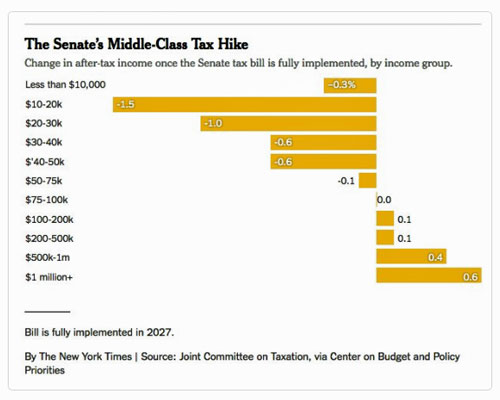
They’re getting screwed just like they were when they charged up all those Christmas goods on their Capital One card and took out a payday loan so they could buy a turkey for Thanksgiving.
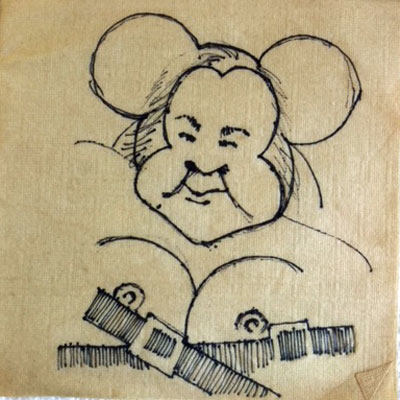
Sea Gull Cellar Bar Napkin Art, artist unknown
On the left the cry is for social justice, but without clearly defined goals social justice is too amorphous a thing to be seeking. The left is in disarray with no clear leader and without a slogan to carry the crowd forward. While they revel in the comedy shows ridiculing Trompudo, our Hobbesian “strong man” stacks the courts with his “really great guys,” trashes environmental regulations, and unleashes the corporations to further enrich his hoity toity friends while explaining with a straight face that the rich must get richer so that an overflowing pot will trickle down to the man in the street. It was true once but hasn’t been for years. The productivity of the typical worker has been increasing but wages have not.
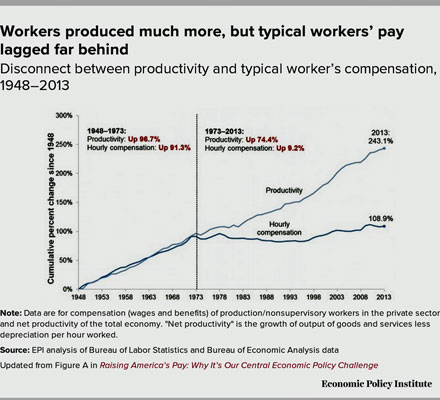
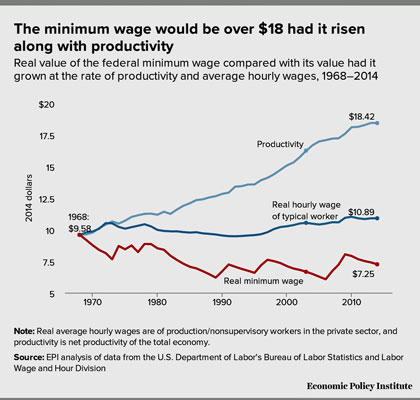
The one great exceptional thing about America is the people who live and work here, that strange melting pot of misfits we’ve somehow managed to hold together. Diversity makes us stronger. We are in danger of losing that advantage today because the extreme income and wealth disparities referenced above are creating bitter divisions between us. “Short of genius, a rich man cannot imagine poverty.” So said Charles Peguy. And since most rich men are not geniuses, they divide the poor between those who cherish guns and those who don’t, those who think abortion is murder and those who think a woman should have the right to choose, those whose jobs depend on oil and coal and gas and those who think these forms of energy pollute the environment, those who think being politically correct is in most cases a form of common decency and those who consider it weak and overwrought, those who point to “safe spaces” and “trigger warnings” as a reason to limit freedom of speech and those who push free speech beyond normal limits, and on and on. While we fret and fight over these social issues, the high-mucky-mucks do what they do best, they accumulate.
A minority of cranky mostly white mostly men who feel threatened as the world moves on without them hearten back to a time they imagine in their fantasy to be a pristine age. It wasn’t. It was that “solitary, poor, nasty, brutish and short” life we’ve managed to escape during the moments we’ve worked hard for one and all. All those hard won gains are in jeopardy today.
Capitalism and democracy are messy and ugly and disorganized yet they can provide solutions to our problems. There is nothing automatic about it in spite of the myth of the “self-organizing” economy. Adam Smith had a brilliant idea with his “invisible hand.” But he knew better than anyone that the fingers on that invisible hand were crooked.
People of the same trade seldom meet together, even for merriment and diversion, but the conversation ends in a conspiracy against the public, or in some contrivance to raise prices. Adam Smith, The Wealth of Nations
He railed against monopoly and unfair competition and unbridled greed as forcefully as he bemoaned an overbearing and bureaucratic government. He did so with the knowledge that there is more to life than accumulation. (Smith wrote another book, Theory of Moral Sentiments, which his admiring flock of capitalist apologists more or less ignores today.)
Ordinary People have fought for and won their rights as individuals each one begrudged and resisted by the ruling class (those “elites” on both sides of the political spectrum). Those rights did not come automatically.
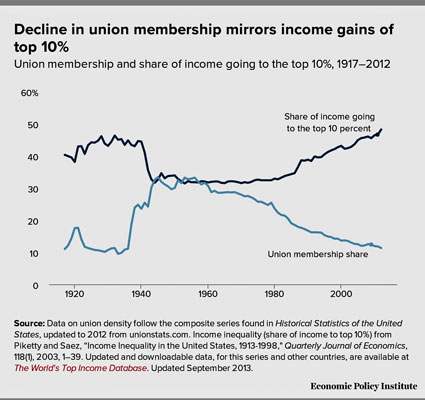
The apex of Western enlightened culture was once supported by a slave society. It was bastardized by the Romans who over reached, gorged on their horn of plenty much like the uber-rich of today. The hordes from the north and east destroyed Rome leaving the Middle Ages in their wake. The early pangs of industrial capitalism were quite ugly. Child labor, unsafe working conditions, horrendous pollution, no safety net. Jesus, Marx and the Romantics found their sensibilities offended much like the snowflakes of today. It has been give and take since then with some evils behind us but others still ahead. No one ever said it was easy. Eternal vigilance is the price of Liberty.
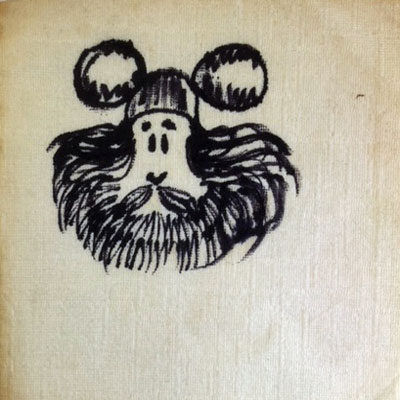
Sea Gull Cellar Bar Napkin Art, artist unknown
America has played an important role, sometimes good, sometimes bad, in the improvement of living standards for the common man. If we are to survive we must work together as a team. While their will be stars, even superstars, on that team we cannot afford to treat the ordinary team members as so much fodder to be held in bondage and herded like cattle. Not if we want our country, an already great country, to survive.
I’ve had my time and my say. It’s time for the next generation but I hope you will allow me this one last thought. The high-mucky-mucks are about to pull off the biggest heist in history. At a time when inequality is at its highest point they want to make it even higher. Resist.
I’m not a communist or even a socialist though at times I claim to be so for purposes of argument. I’ve run two businesses, modestly successful, employed hundreds of people over time, all on a small scale. I know what capitalism and democracy can accomplish when things go right. I also know what happens when greed runs amok. The vandals show up and tear down the walls of the city. I am an avowed atheist but not anti-religion. Religion serves an important purpose. In no way do I consider myself a Marxist but Karl Marx had religion right. Unfortunately he is more often than not misquoted. He didn’t just say, as many maintain, that religion is the opium of the people. He said this, something much more profound:
Religious suffering is, at one and the same time, the expression of real suffering and a protest against real suffering. Religion is the sigh of the oppressed creature, the heart of a heartless world, and the soul of soulless conditions. It is the opium of the people.
Karl Marx, A Contributuion to the Critique of Hegels Philosophy of Right
Real suffering, oppression, heartlessness. Think about it. I hope our legislators think about it before they pull off the greatest heist in history. Or, maybe they already have..

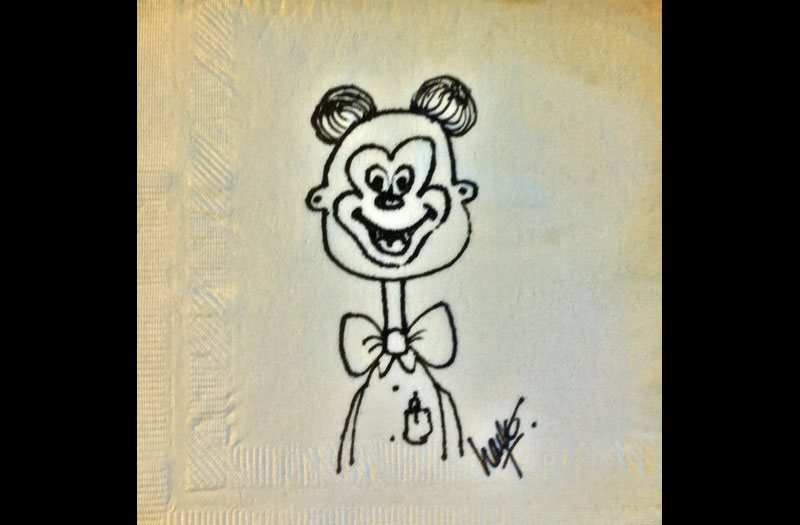
You would make me think in the night! “The greatest heist in history.” And there is a history, with ample practice for t he next big one.
Thanks particularly for the thoughts on Adam Smith and his The Wealth of Nations. I did open the link to the review of his less-known book, The Theory of Sentiments. That he was friends with philosopher David Hume speaks well; they both held empathy and benevolence as the platform for ethical reasoning, and as you point out, that is little known among usual readers of The Wealth of Nations.
A well done piece, David.